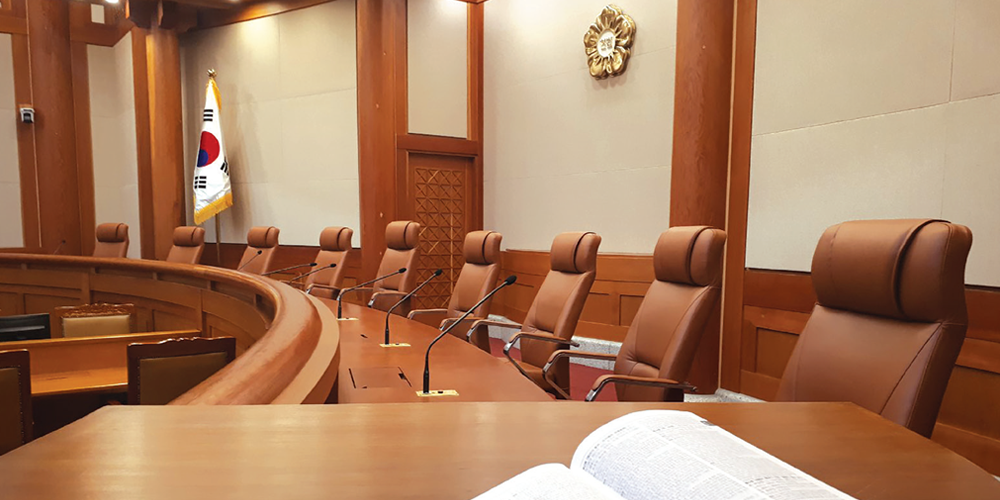Jurisdiction
Adjudication on the Constitutionality of Statutes
This is a system that nullifies any statute that has been found unconstitutional by the Court. It is a core component of constitutional adjudication, by providing a mechanism to protect the Constitution against arbitrary legislation.

Causes for Request
When the issue of whether or not statutes are constitutional is the basis of the judgment of the original case, an ordinary court may request the Constitutional Court, ex officio or by decision upon a motion by a party, adjudication on the constitutionality of statutes.
Subject
The subject of adjudication on constitutionality includes statutes legislated by the National Assembly, as well as emergency presidential orders, treaties, and universally accepted international laws.
Request Procedure
The request on adjudication on unconstitutionality of statutes can be made by individual ordinary courts, but only through the Supreme Court. Should an individual wish to submit a motion to the ordinary court for request of a constitutional review, the motion must specify in writing: the case and the parties; the statute or any provision of the statute which is interpreted as unconstitutional; and, the reason it is interpreted as unconstitutional before submitting it to the court concerned. The court’s decision to accept or dismiss the motion is final and cannot be appealed. When an ordinary court requests to the Constitutional Court an adjudication on the constitutionality of statues, the court’s written request to the Constitutional Court shall include the following: the requesting court, the case and the parties; the statute or any provision of the statute which is interpreted as unconstitutional; reason it is interpreted as unconstitutional; and, other necessary matters.
Suspension of Proceedings
When an ordinary court requests to the Constitutional Court adjudication on the constitutionality of statutes, the proceedings of the court shall be suspended until the Constitutional Court makes a decision. If the court deems it urgent, however, the proceedings other than the final decision may continue.
Submission of Opinions
The parties to the original case and the Minister of Justice may submit to the Constitutional Court an amicus brief regarding constitutionality of the statute.
Decision and Effect
The Constitutional Court will decide the requested statute or any provision of the statute as unconstitutional, when it finds the request to have grounds. However, if it is deemed the whole statute becomes unenforceable due to the provision concerned being ruled unconstitutional, the whole statute can be declared unconstitutional. Depending on the content of the statute, the Constitutional Court may decide on the case as nonconforming to the constitution, unconstitutional in part, constitutional in part, as well as unconstitutional. The Court’s decision of unconstitutionality shall bind the ordinary courts, other state agencies and local governments. Any statute or provision thereof decided as unconstitutional shall lose its effect from the day on which the decision is made. However, the statutes or their provisions relating to criminal penalties shall lose effect retroactively. If the statutes or their provisions had been previously held constitutional, they shall lose effect from the day after the decision upholding their constitutionality was made. A retrial may be allowed with respect to a conviction based upon the statutes or provisions on criminal penalties which have been decided as unconstitutional.